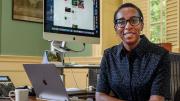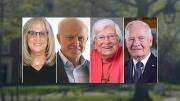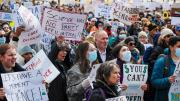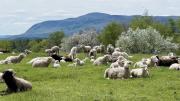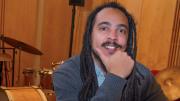When she assumed the office in August 2018, Claudine Gay was unusually well prepared to become dean of the Faculty of Arts and Sciences (FAS). She knew the faculty as a student (Ph.D. ’98), professor (arriving in 2006, after six years at Stanford), and academic leader (dean of social science beginning in 2015). In the latter capacity, she directed academic planning and faculty development for more than one-third of FAS’s ladder-faculty members; interacted with her peer divisional deans, becoming familiar with other disciplines and departments; and worked with her predecessor, Michael D. Smith, thus gaining what she called her “primary window into the FAS dean’s role.” A self-described “empirical political scientist” whose research was “very data driven,” Gay was temperamentally inclined to explore opportunities and challenges systematically. Finally, she had served on the faculty advisory committee for the presidential search that resulted in the selection of Lawrence S. Bacow: a useful introduction to the person who appointed her, and the key University relationship for any FAS dean’s success.
So much for best-laid plans. In a July Zoom conversation preceding her third anniversary as dean, Gay spoke from University Hall—the first time she had worked there throughout the week after a nearly complete pandemic exile lasting almost half her time in office. She exulted in the “awesome serendipity” of a lunchtime walk across Harvard Yard the day before, when she had seen a faculty colleague and enjoyed a casual conversation for the first time in forever. She marveled, “It was great.”
Understandably so after 17 months of worrying about students’ safety as they dispersed from campus, professors’ health, the fraught pivot to remote instruction, countless plans to reopen facilities, and considerable financial angst—a sustained crisis that had not even begun when she had prepared to become dean 18 months earlier. It is easy to overlook how much the coronavirus changed the lives and perspective of deans. As front-line officers, they have been responsible for hundreds or thousands of people’s well-being and, where possible, academic progress under unprecedented circumstances—and for charting a course back toward normalcy. Far more than stereotypical professors, who are most animated by their intellectual passions, effective deans are people people. Interacting with smart colleagues, engaging with supportive alumni, and bumping into effervescent students fuels their work.
Recalling her perspective when she was appointed, Gay enumerated her priorities within the social sciences. First came faculty renewal: making more progress on diversity (to the extent that the recently completed Harvard Campaign provided the financial means for some appointments). Second, she cited updating the academic experience to take account of “students who are much more action-oriented” and interdisciplinary than predecessors: their intellectual interests often proceed from political or other passions. Third, as a corollary, she was focused on “space as it pertains to the faculty”: enabling interdepartmental work on a campus “not built for collaboration.”
Finally, as an overarching concern, she talked about “culture change.” The faculty, she continued, are “so central to everything we do” academically, “but they are also incredibly central” to Harvard’s culture. “We struggle sometimes to find the right balance between being super-responsive to faculty needs,” she said, “and also elevating and articulating the responsibility faculty carry to students, to the institution, and to one another.”
In faculty recruitment and retention, she amplified, Harvard did not stress those reciprocal obligations enough. She sought to “chip away at the excessive deference and pair it with a greater sense of collective ownership and responsibility for making this place work for everyone.” (As Gay was soon to discover, dealing with ways in which it had not worked would come to rank high on her early FAS agenda.)
All in all, she began her new role with the sense that “anything is possible because the fundamentals are so strong”—from the faculty itself to FAS’s finances after sustained budget discipline under Smith and the largess from the capital campaign. Even with her background, as Gay set out learning more about FAS and the University—most deans’ first-year priority—she found “my aperture widened considerably.” She immersed herself in the sciences and engineering (“I always go to them,” she emphasized, to see how the work proceeds in situ, and, she laughed, was welcomed to tour labs “as long as I didn’t touch anything”), athletics, and such diverse realms as the events staff. Across the board, she found, “People really care about the mission,” whatever their role in advancing it. “That’s pretty special.”
In general, that immersion “made me appreciate how things I’d observed in the social-science division were manifestations of the general phenomenon,” such as an increasingly diverse student body—the impetus for both curriculum change and more concerted focus on inclusion. In other words, Gay continued, her initial inklings were not off base, but they were “not sufficiently capacious and nuanced.” She arrived at the view of “the kind of FAS I wanted to build,” within the faculty’s means, characterized by three overarching priorities:
• “advancing academic excellence in a way that feels relevant for today” and coming decades;
• “innovating in the student experience,” undergraduate and doctoral; and
• generally, “culture”—especially concerning faculty, but more broadly, so that “we are able to be the place that we aspire to be.”
Among those academic priorities, Gay emphasized “building our strength in interdisciplinary fields”—including reinstating the search for a “cluster” of four scholars in ethnicity, indigeneity, and migration last fall, after the initial pandemic pause on hiring: an area she termed academically exciting and of deep interest to students. Other examples include the recently announced quantum-science initiative and the work on inequality she launched as social-science dean (see, respectively, harvardmag.com/quantum-phd-21 and harvardmag.com/fas-inequality-17).
The second priority stems from “students’ desire to pair academic discovery with engagement,” as she phrased it: work pertaining to social justice and other kinds of activism, but also, more broadly, reflecting the reality that undergraduates are “coming from just a huge diversity of K-12 and especially high-school backgrounds.” To “enable them at every part of their Harvard journey to make authentic choices,” the dean continued, she is focused on both overcoming gaps and challenges students encounter while they are at the University and making their experiences truly inclusive—for example, so they persist in their chosen concentrations, realizing their ambitions.
The positive way of talking about culture is Gay’s emphasis on “getting to a place where connection and collaboration are easier and just second nature.” Here, the pandemic helped: the forced pivot to online instruction in March 2020, and immersive faculty training in more effective remote teaching that summer, required professors to work across silos, engage with pedagogical and technology experts, and more. Given her focus on making Harvard “a place where as a working community, we’re stronger, healthier, and more effective,” the efforts to sustain instruction and restart research by mid 2020 were a bracing demonstration of what FAS people, under duress, can do.
Of course, there is a darker side to the culture challenges Gay perceives, and has been forced to correct. Asked about what she called “deferred maintenance,” she acknowledged the series of sexual harassment and misconduct cases she has decided, including those of retired professors Jorge Domínguez and Gary Urton (both stripped of emeritus status and banned from the community); Roland Fryer, recently allowed to resume teaching, with conditions, after a two-year administrative leave; and Martin Nowak, sanctioned for his program’s involvement with convicted sex offender Jeffrey Epstein.
“I don’t relish the many opportunities I’ve had to communicate about these,” Gay said. She has used her announcements of her decisions to detail for faculty, students, and staff the norms of behavior that now prevail, and the conditions of accountability and transparency that must surround compliance with them. Title IX processes, standards of professional conduct, and changes in the everyday culture, she insisted, are “directly tied to our institutional ambition to be academically excellent. It’s not a side project.” Harvard, she continued, “doesn’t exist alongside society—it’s part of society,” so it is prey to some of the same failures and “the same kind of reckoning that’s happening in the broader culture.” Confronting those realities as dean, one senses, has sharpened her focus on the urgency of effecting cultural changes, and their scope.
With in-person campus operations resuming this fall, how has FAS emerged on this side of the pandemic?
“Everyone stepped up and rose to meet the challenge,” Gay said. Although she acknowledged that the exigencies of de-densifying the campus and rejiggering education on the fly delayed work on the faculty’s long-term priorities, it didn’t end them: “Enduring issues endure.”
The pandemic delayed work on the faculty’s long-term priorities, Dean Gay says, but they remain intact: “Enduring issues endure.”
On the upside, the urgent, uncharted work of preparing for COVID-19’s spread has “totally increased my confidence in what I can ask people” to do. Faculty members redoing their teaching, technology experts migrating thousands of courses across the University online, had an effect: it was an opportunity, Gay realized, “to model how to work across siloes, within and beyond the FAS,” and for everyone to recognize the value of participating in obviously meaningful work. FAS’s pandemic task forces involved more than 100 faculty members, and set the stage for a safe academic year 2020-2021 (albeit with remote instruction, strict social distancing, and many people learning far from Cambridge).
In retrospect, Gay could now characterize the experience as a “model for how I want to tackle just about everything that’s hard” and a collective effort that “revealed competencies” that neither she nor the people who exhibited them had fully recognized: in strategic thinking, or acting quickly (rather than deferring action to plan a seemingly perfect way to proceed). The pandemic also fostered higher-level cooperation: with fellow deans (who provided “comic relief when you really needed it”), and with a supportive administration, from the president and provost through University health experts.
Those energies ought to carry over to her hopes for students’ academic experience. Gay said that faculty members as a whole now have “more confidence in their ability to innovate” as teachers. Students and their professors have always shared a passion for Harvard’s pioneering scholarship, she said; resuming full-scale research amid wide pedagogical experimentation and enhancement—and demonstrated student responsiveness—promises to be rewarding.
Just as the pandemic showed members of the community how they could respond to a universal threat, she said, the experience illuminated for all some of FAS’s longer-term constraints. Although the revenue and expense impacts of the pandemic were significant, Gay noted, the financial outcome was not the “disaster” forecast a year ago: a projected nine-digit operating loss, and a cash deficit in the tens of millions of dollars (see harvardmag.com/covid-fas-finances-20). Still, she indicated, when FAS’s fiscal year is reported this fall, it will “certainly” show a deficit (apparently reduced in part by stupendous support from alumni friends and others).
The larger picture, she indicated, is that FAS’s core academic obligations outstrip its resources, given its continuing dependence on endowment funding (much of it restricted). Accordingly, she foresaw the “need for more flexibility that supports innovation”—both financial dexterity and organizational suppleness. She began discussing these concerns in a town hall for faculty members last April. A deeper look at the costs of conducting FAS’s academic work, the constraints on endowment distributions, and the institution’s history of “starting things without ending things” is forthcoming from a faculty working group, perhaps this fall. That could form the basis for a conversation about how to sustain research and teaching by adapting FAS’s operations and finances, while funding new fields.
The subject, Gay said, commands urgent attention—not least because some investments, like the initiative in quantum science and engineering, require “different kinds of resources, priced differently in the market,” compared to work in other domains. Across FAS, she continued, the goal is to “create the optimal conditions for recruiting the best scholars and generating the best, highest-quality research,” from laboratory science to work on inequality.
As she proceeds, her team has evolved, with appointments of new leaders for athletics, the Division of Continuing Education, and FAS’s administration and finance operations, and a new associate deanship for diversity and inclusion. To a striking degree, these senior officers have come from other institutions. It is a good thing, Gay said, to “denaturalize things”: assembling a cohort that is both more diverse and able to bring a fresh eye to FAS’s “norms and practices.” Part of changing the culture, she continued, means recognizing that there are “lots of opportunities for growth in our hiring practices,” which have tended to “privilege Harvard experience to an extreme degree.”
Also striking are the long, personal messages Gay disseminates to introduce these new colleagues to the FAS community. In part, they compensate for the remote conditions during the pandemic. “It’s very important,” she said, “for people to understand who are the other members of the community, what role do they play.”
Beyond that practical aim, Gay conveyed a deeper motivation. “I like talking to people!” she laughed. “I love to humanize people.” That is the very thing the pandemic has precluded, and the hopeful prospect of the new academic year: the promise, this fall, of chance encounters with professors and students in the Yard again. With that ultimate reward in sight, Gay said, she was ready to “double down” on her FAS priorites “with increased comfort and new tools.” Contemplating the work of effecting her broad goals—pursuing academic excellence, enhancing the student experience, and renewing the culture—she said, “I feel engaged and confident that we can actually do this.”
